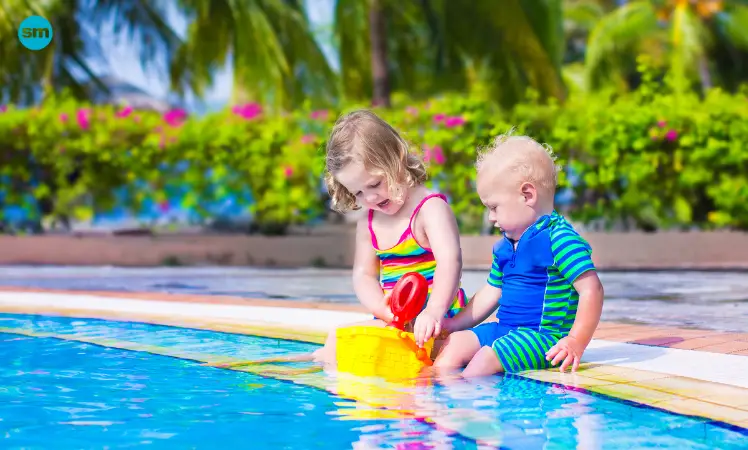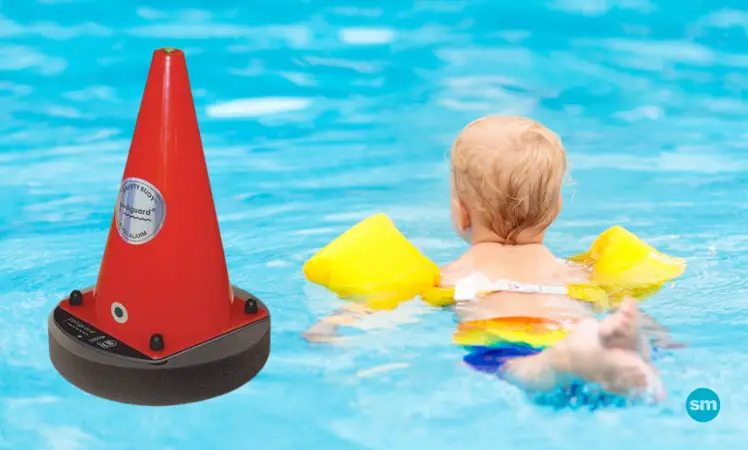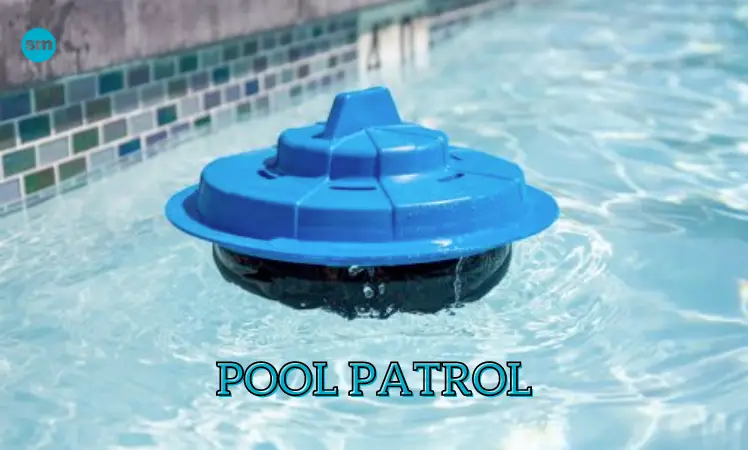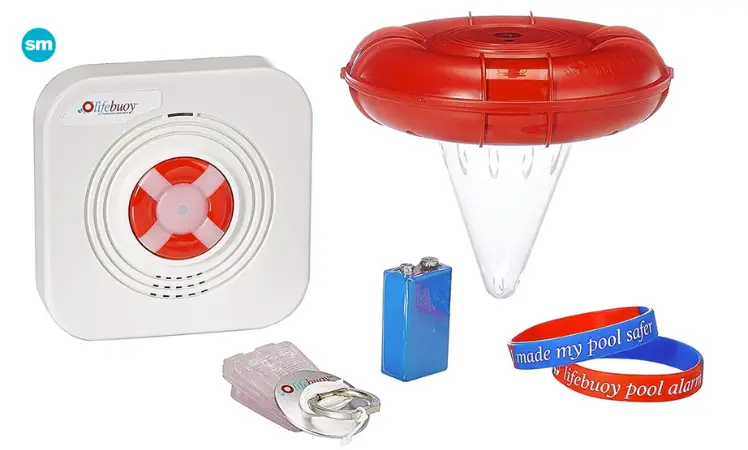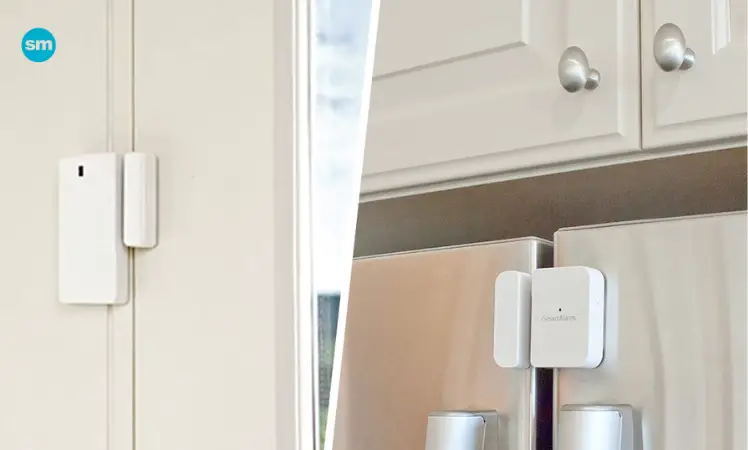Last Updated on January 16, 2024 by Lori Pace
It’s great fun to have kids and a swimming pool in your backyard. It should be. We know that this isn’t always the best combination. Owning a pool comes with some risks. We are responsible for all that could happen, including fatalities and injuries. Installing pool safety devices is the best way to ensure safety in your facilities. These include pool alarm for kids.
Best Pool Alarm for Kids
Although pool alarms are expensive, safety and lives can be saved. If you have a pool, the best way to ensure your children are safe is to not only get one alarm but to use at least two alarms. Consider your situation when choosing the right product.
Top useful features in Pool Alarm for Kids
- Alarm/siren volume: The alarm volumes of the products in this list range from 85 to 100 decibels. You can use the loudness of the alarm to either secure your pool, or make your neighbors mad. The alarm volume should be set to the highest level.
- Remote/indoor alarm: This device will increase the alarm’s capabilities. This device sounds an alarm simultaneously with the one near the pool when something large enters the water. This is installed in the house so you can hear it. A remote alarm has a range of 200 feet.
- Motion sensors: A floating alarm is best for smaller pools. They are also simpler to install. However, underwater sensors are more likely to cause false alarms and can be used in larger pools.
- Controls: Certain alarms will require magnetic keys. It can be a little tricky for others, but it adds security. This means that only the person with the key can turn off the alarm or activate swim mode. This is a great defense against intrusions.
Best Floating Wave Sensor For Above Ground Pool
Floating alarms can be set up in minutes. There is no need to drill holes in your pool. You can simply insert the battery and adjust the sensitivity, then let it float on the water. To prevent it from floating around, tie it to the other side of your pool.
Poolguard Safety Buoy
The traffic cone-shaped floating alert costs around $168. It is best for pools between 18 and 36 feet. To power the buoy, you will need a 9-volt battery. The battery has a life expectancy of 1 year.
The alarm sounds at 97.9 decibels. This is similar to a small motor. Although there are louder options, if your pool is close to your home, it should be easy to hear. You can also use the receiver up to 200 feet away.
It can be difficult to turn off the alarm. Instead of pressing a button, you will need to use the key provided with it. The buoy can be too sensitive for some users.
Advantages
- Affordable
- You can also bring the alarm inside the house
- Ideal for houses and pools of average size
- It shouldn’t be too loud to wake the neighbors
Disadvantages
- Too sensitive can lead to false alarms all the time
- It is difficult to turn the alarm off.
- The size of your pool may determine how much the cone-shaped design can hinder your ability to swim.
Pool Patrol PA-30
Use Pool Patrol PA-30 alarm for larger pools. This alarm is best for pools larger than 20×40 feet. It costs around $200, which is quite high. The rotating base can be turned to adjust the alarm’s sensitivity. It is also the easiest way to turn off the alarm.
This is loud enough to hear, but not loud enough to be a problem. The remote receiver has a range of 200 feet. Pool Patrol is powered by a 9-volt battery, which you can install under the pool.
Advantages
- It is easy to set up and then turn off
- You can adjust the sensitivity to make it most comfortable
- You won’t miss it if you set the alarm louder
- Not a bulky design
Disadvantages
- Expensive
- To make adjustments, you’ll need it to be picked up from the pool
- Fine-tuning the sensor is essential
Lifebuoy Pool Alarm System
This alarm alerts you when your pool cover has been removed. The smart floating device is a smart one that activates automatically after 10 minutes without water activity. The phone app allows you to adjust the sensitivity and turn the alarm off. You can change the setting of your device via Bluetooth without getting wet. However, the app works only when you are at home or within range of the alarm.
Lifebuoy is recommended for pools up to a mid-range size. The device’s long-range RF detection can detect any movement in the water. If you have larger pools than 40 feet in depth, I recommend using two devices at each end.
This floating alarm is superior to previous ones. It is also more expensive at $300. This device can also be used with a 9-volt battery.
Advantages
- Uses a pool cover
- You can easily modify the settings and turn off the alarm hands-free
- You will be notified via the app or indoor unit
- Swim mode activates on its own
Disadvantages
- Expensive
- It takes a while to get out of swim mode.
- Requires reliable wireless connectivity
Best Immersion Sensor For In-Ground Pool
It’s also called a sub-surface detector. These alarms can be fixed to one side of the pool. For some models, drilling holes is required to place the alarm.
These alarms are less likely than other alarms to cause false alarms. The pressure changes are what trigger the underwater sensor, so it won’t be activated by surface activities such as a falling leaf.
Smart Pool PE23 Pool Eye AG/IG
This device might be the best for you if you are looking for the loudest pool alarm. The 9-volt battery powers the device. It also sounds at 101 decibels, which is equivalent to a motorcycle’s engine. The smart pool can detect people entering the water, but it cannot detect smaller objects such as small balls or shirts. This can be used in pools no larger than 18 by 36 inches.
However, not everyone is impressed with how the device is installed. There are many screws that you can use to modify the device. To use it, you will need to drill on the pool’s side. You will also need to place it in a corner of your pool with a platform over it.
It can be tedious to turn the alarm off. To turn the alarm off, you will need to simultaneously use the magnetic key and press a button. You can also use the receiver to take it inside, but the effective range is only 100 yards.
To turn on the swim mode, hold down the key and press the button while you use the pool. After 5 minutes, the device will automatically reactivate itself.
Advantages
- Affordable
- The device doesn’t move around and stays put.
- Swim mode activates on its own
- Sensitive enough for detection of larger objects and humans
Disadvantages
- Installation requires more effort
- It’s difficult to get off the hook
- This might be too loud for a noisy neighborhood.
Pool Eye PE14 Pool Alarm
You can keep your pool safe for pets and children for as low as $60 to $80. The Immersion Sensor emits 85 decibels of loud siren, which is loud enough to be heard by anyone in the vicinity.
The device can detect small children, animals, and objects as light as 15 pounds. Rain and wind are unlikely to set off false alarms because the device uses an underwater motion detector. The PE14 pool alarm works best for above-ground pools 16 by 32 feet, or 24 feet. The device can be powered by a battery. To turn off the alarm, it requires a magnet key.
Advantages
- Affordable
- There are fewer false-positives
- Worked with children as small as 3 years old
- Ideal for pools of average size
Disadvantages
- No in-home remote
- If the pool is further away from your home, it may not be loud enough
- It is possible to lose the key and be unable to turn off the alarm.
Blue Wave Pool Watch Alarm System for Kids
This pool alarm can be used for above-ground or in-ground pools. The electronic sensor in the immersion sensor detects if an object over 18 pounds has entered water. This sensor is suitable for older children and larger pets.
The package includes an in-home alarm. However, its effective range is only 100 feet. So, this shouldn’t be an issue if your house is small. For installation, you will need to drill on the platform or pool rail. However, some people find this too difficult.
Advantages
- Rain and wind are not too important to you
- This is a great option if you have large dogs or older children
- Includes an in-home remote
- It is suitable for all types of pools
Disadvantages
- You can increase the range of your receiver
- To install the device, you will need to drill.
- It is not recommended if you have puppies or toddlers younger than 3 years old
Best Pool Door Alarm for Kids
This device can be installed at gates and other entrances to the pool area. This alarm alerts you when your pet or kid passes the threshold. You can avoid potential disasters before they occur. Boost your pool security. This pool alarm can be used in conjunction with a floating or sub-surface alarm.
iSmartAlarm DWS3R Contact Sensor
This high-tech device can be added to your pool security without you needing to be technical. This contact sensor can be used for all openings and closings, not just pool gates. You may also mount this on your fridge, if you don’t want someone sneaking in for a midnight snack.
iSmartAlarm is a wireless alarm which sets off when two sensors are separated from one another. The app on your smartphone will notify you of the alarm via sound and vibration. This will let you know if anyone has opened the gate or door to the pool, even if you are on the other side.
Advantages
- Easy to move and install
- The phone app can sound an alarm or send you alerts through the app
- As many devices as you require for the same system, you can add to it.
- To turn off the alarm, you don’t have to go directly to the device.
Disadvantages
- Internet connection is required
- You may have to pay extra for security devices.
- If you add more devices to your system, it can become expensive.
Best Wearable Wristband Pool Alarm for Kids
This fashionable, wearable device allows you to look after your child while still being stylish and kid-friendly. This alarm type is unlike other types and requires very little installation. You can enjoy better security while you relax at the beach or pool with a simple plug-and play.
Safety Turtle 2.0
The device package is very easy to use. The Turtle wristband is worn by your child whenever they are near the pool. Next, place the base within 200 feet. That’s all. The base alarm will sound when your child gets into the pool.
Safety Turtle’s unique feature is that you can take it with you wherever you go for a swim. This alarm will give you extra security, whether at the beach or on the lake. For additional children, you can add more Turtles. Then if you have pets, there are Turtle collars. The original package can be purchased for $190. You can also purchase additional Turtles separately for $74 each.
Advantages
- It’s simple and straightforward to use
- No installation needed
- Relatively long range
- Portable
Disadvantages
- You can make it more expensive by adding wristbands or collars
- Kids could misplace the Turtles
Why Do I Need A Pool Alarm for Kids?
A pool is a great place for your family to have fun. However, as the owner of the pool, you are responsible for keeping it safe. On average, there are 11 drowning deaths in the US and 22 non-fatal drownings each day. These accidents can be avoided in most cases. Therefore, installing the best pool alarms is a crucial step in keeping your pool safe. These security devices are required by law in some states.
Safety is not just about your children, pets, or visitors. It’s possible for someone else’s child to sneak into your pool, and cause an accident. Intruders can be anyone, but not just people. There was a lot of CCTV footage of wild animals entering the pool to take a dip. These videos went viral online. It wouldn’t be a good idea to have an alligator or a bear in your yard.
Are There Any Law That Requires A Pool Alarm for Kids?
There are many laws that govern alarms for residential swimming pools. They vary from one state to the next, and even from one city to another. California, for example, requires pool owners to install at least two safety devices. It is important to research the requirements in your particular area.
To avoid any disasters, it is best to make sure you have every safety device and measure in place. In the event of an accident, you could be held legally responsible.
How Do A Pool Alarm for Kids Works?
The mechanism of a pool alarm depends on the type of device. A floating or surface alarm will function differently to a sub-surface detection alert. Both wearable and gate alarms are completely separate.
The sensors in Floaties are activated when there is a significant increase or decrease in the water surface activity. Immersive sensors, on the other hand, send out alerts whenever something enters water. This causes a change in the pressure around it. Wearables, which send signals to water when they come in contact with it, are simpler devices. Gate alarms are a group of sensors that trigger each other when they lose contact.
1- Surface Wave and Floating Alarm
These devices can be placed either above or below the water surface. It detects any significant changes in the wave size. The alarm sounds when the input exceeds a certain threshold.
Some people find alarms in this category too sensitive. Some devices can send false alarms because wind, rain, or smaller objects, such as a leaf, can cause water to be disturbed.
2- Subsurface Detection
They are placed in one area of the pool, with the sensor submerged in the water. These sensors detect changes in water pressure. Then, the alarm is activated if an object large enough or heavy enough falls into the water. It is therefore less sensitive than surface devices and can detect fewer false positives.
3- Wearables
These devices can be worn as wristbands, collars, or bracelets. The alarm will sound when the device comes in contact with water. This alerts you if your child has entered the swimming pool.
4- Pool Gate Alarm
These sensors are installed at the gates leading to the pool. This sensor alerts you when someone opens the gate, so you can check. Because pool gates are equipped with a self-latching function, this type of alarm is less likely to be false alarms. This alarm can only be activated intentionally.
How to Choose The Best Pool Alarm for Kids?
It is impossible to have all of the benefits and features in one device. It is recommended, if not necessary, to have at minimum two security features around your swimming pool. One alarm can be used to compensate for the other, and vice versa.
1- Alarm type
A subsurface alarm can be fixed to one side of the pool. To screw the device down, you might have to drill holes. This pool alarm is not as complicated as it sounds, and can save you from irritating false positives.
If you prefer floating alarms, then go for them. The most user-friendly is a wearable alarm. If you don’t want to deal with cumbersome installation or false alarms, a gate alarm is also a great option.
2- Pool setup
When buying the best pool alarm, this is the most important thing to remember. It doesn’t matter if you have an above-ground or inground pool, this should be your first consideration.
This is related to the size of your pool. Some devices are best suited for smaller to medium-sized pools. It is not worth buying two floating alarms, when one sub-surface device can do the job.
Ask yourself how you’d like to install your alarm. Do you want to drill holes in the pool’s side? Would you rather have it set up in a simpler way? It is important to ensure that the swimming pool equipment you are looking at is made specifically for your particular pool.
3- Alarm volume
The purpose of the alarm system is defeated if it’s not heard. You don’t want neighbors complaining about the noise.
Take into account the distance between your house and the pool. Also, consider how far your neighbors are from you. Then, determine the decibels that a device volume is based on. For a small backyard, a lower decibel level will work best. Anything higher than 101 decibels is better. It is also important to keep a good distance between your home and the rest in the area.
4- Remote alarm
You might find it difficult to hear the siren at the pool from your house. You will need a receiver you can bring into your home if this is the case. When it is triggered, the remote alarm will sound together with the one near the pool.
5- Effective range
In-home alarms have a range of 200 feet on average. This can allow the receiver to reach further than the kitchen. This distance might seem too far, but it may work depending on the distance to the pool.
6- Quality
People who say you won’t know until it’s tried don’t believe me. Learn from the experiences of others. User reviews are an excellent resource when searching for the best pool alarm.
Try and test brands to get the best results. These products are most often successful because of the satisfaction of other users. You can also judge the quality of a product by what others have to say.
7- Ease of use
It is not possible to set the alarm even when you are swimming in the pool. It shouldn’t take too much effort to turn off the alarm or switch the device to swim mode. The alarm is there to give you peace of mind and not as a nuisance.

